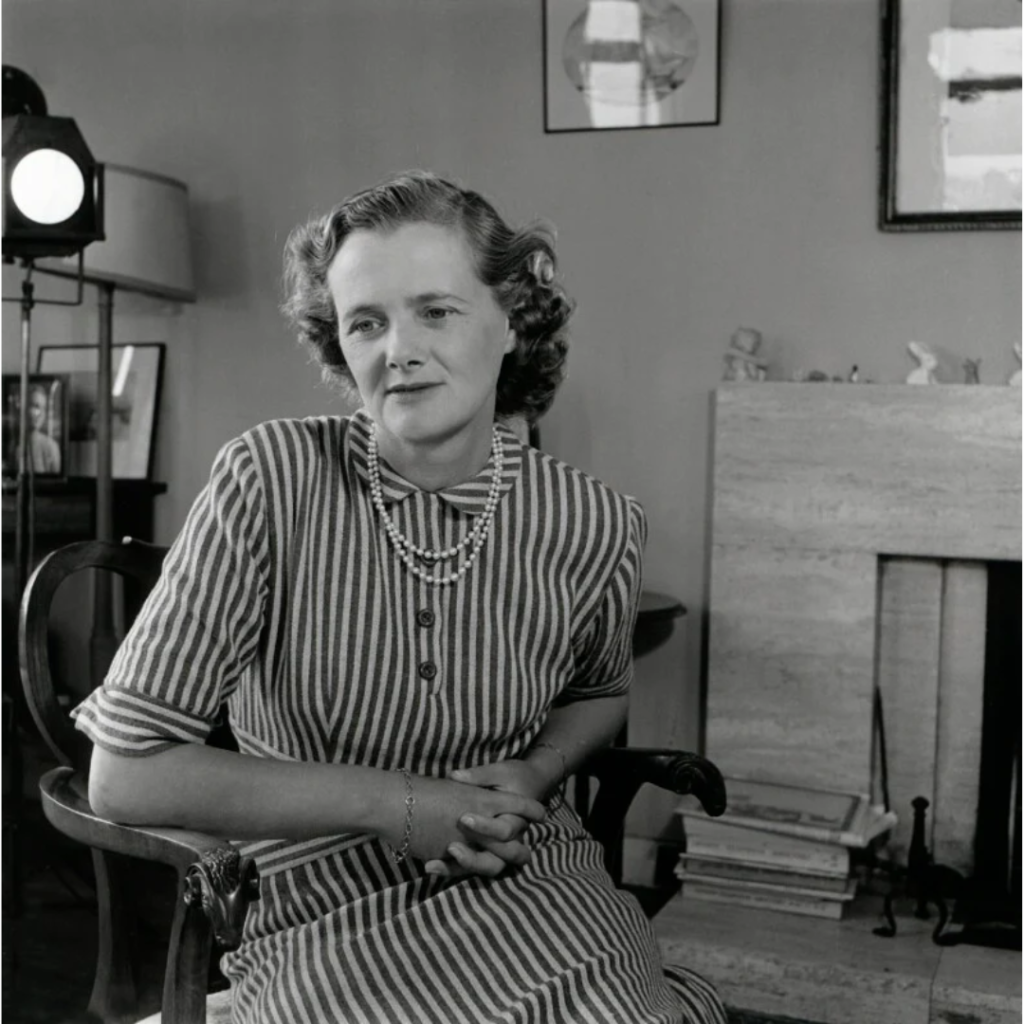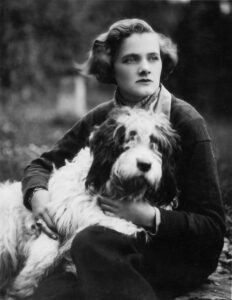
We are kicking off our new Author Spotlight series with British author Daphne Du Maurier. The Alfred Hitchcock course will be discussing the 1940 film Rebecca on January 22. The image above is from the National Portrait Gallery in Lodon.
Daphne du Maurier was born in May 1907 to actors Gerald and Muriel Du Maurier. Her paternal grandfather was George du Maurier, a cartoonist who created Svengali. She was also cousins with the Llewelyn Davies boys which served as the inspiration to J.M. Barrie’s Lost Boys in his famed work, Peter Pan.
Du Maurier wrote her first novel, The Loving Spirit, in 1931. The book was well received when it was released but it wasn’t until her fifth book, Rebecca, was published in 1938 that would make her a household name. Rebecca follows the new wife of Max de Winter as she becomes obsessed with finding out about the mysterious death of his first wife. Du Maurier became a best selling author. The book has many themes inspired by Charlotte Bronte’s classic Jane Eyre, who was one of Du Maurier’s favorite authors. Two years after its publication, producer David O Selznick bought the film rights to make it a movie. This project would be the first American film made by Alfred Hitchcock. Du Maurier said during the making of the film that Rebecca is a story about jealously.
In 1947, Du Maurier and her publisher were accused of plagiarizing Brazilian author Carolina Nabuco after the author claimed that the plot was taken directly from her 1934 book, A Sucessora. Nabuco did not sue Du Maurier’s publisher and when the film Rebecca was releasing in Brazil, Nabuco did not sign a letter from United Artists stating that the plots were just a coincidence. In 1944, Du Maurier was sued by Edwina MacDonald. MacDonald claimed that Du Maurier copied her story Blind Windows the stories share the same scenes and at some points dialogue. This complaint would be dismissed by a judge in 1948.

In 1952, Du Maurier released a short story collection titled The Apple Tree. Her story, The Birds is the most terrifying take on man vs. nature. Set in a costal town in England, the story centers around a true disturbing behavior of birds. This story got more famous after it became the basis of Hitchcock’s 1963 thriller film of the same name.
Du Maurier died of heart failure in her sleep on April 19 1989 at her home in Cornwall England.
The image above is from a New York Times Article, In Praise of Daphne du Maurier
Daphne Du Maurier books
Rebecca
My Cousin Rachel
Jamaica Inn
The House of the Strand
The Scapegoat
Enchanted Cornwall
Books about Daphne Du Maurier
Daphne du Maurier, Haunted Heiress by Nina Auerbach
Manderly Forever by Tatiana Rosnay
Daphne du Maurier and her sisters by Jane Dunn
Daphne du Maurier: the secret life of the renowned storyteller by Margaret Forster
Films based on Daphne du Maurier books.
Rebecca
Don’t Look Now
The Birds
My Cousin Rachel (1952 and 2017)
Jamaica Inn
The Scapegoat
Frenchan’s Creek
Hungry Hill
The Years Bewtween
Sources
Olivia Laing. Sex, Jealousy and Gender: Daphne du Maurier’s Rebecca. The Guardian, February 13 2018.
Du Maurier cleared in Plagiarism. The New York Times. New York, New York. January 16, 1948
Rosemary Counter, Who Really Inspired Daphne Du Mauroer’s Rebecca. October 19, 2020 from Vanity Fair
MacDonald v. Du Maurier, Case Text. August 18, 1944
Justia US Law: 75 F Supp 655 S.D. NY 1948, MacDonald v Du Maurier
Anne Cohen. The Real Story Behind Rebecca. October 21, 2020. Refinery29
Rebecca’s author denies plagiarism. The New York Times. New York, New York. October 28, 1947
Frances R. Grant, The Long Arm of Literary Coincidence. New York Times, Noveember 16, 1941
Paul Sehgsl. In Praise of Daphne du Maurier. The New York Times. July 6, 2017


Recent Comments